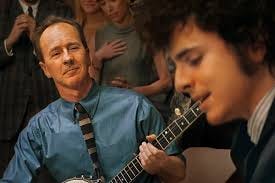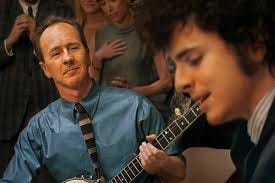FOR YOUR CONSIDERATION: Edward Norton for Best Supporting Actor
Norton's turn as folk hero Pete Seeger won't win any awards. Perhaps we should take a deeper look.
Here’s something thorny to debate about: it is unclear if the central conflict at the Newport Folk Festival, where Pete Seeger wanted to unplug Bob Dylan during his performance at the festival for playing electric guitar, actually happened — or at least happened in the way A Complete Unknown would like for you to believe. Seeger was on the festival’s committee and one of Dylan’s early mentors when the Blonde on Blonde artist first came to New York in search of musical glory. Seeger, a folk artist with left-wing politics, was a political artist. Dylan’s music when he first became famous — mostly protest music that birthed from antiwar and civil rights activism — feels indebted to Seeger’s work as a folk artist and activist. Although Dylan was more personally and romantically slippery than Seeger, they were absolutely part of the same tree. It is said that Seeger went to unplug Dylan’s mic and sound because of his frustration at Dylan’s electric music at his staunch folk festival; Seeger has said it was because he was angry that nobody could hear a thing during the set, not because of the electric music. Who’s telling the truth? It has never been completely answered, but it’s the central schism in Bob Dylan’s career, and a lowpoint for him personally. It makes sense why A Complete Unknown would make it such a pivotal, if not most important, scene in the movie.
By the time the Newport Folk Festival was set to start, Dylan was going in a different direction, much different than the folk purity that Seeger was most known for. Bringing It All Back Home is the first foray into electric instrumentation, a startling change for fans of Dylan’s previous albums. A Complete Unknown is a movie about many things: the self-mythology of a rock star, romantic relationships with other musicians, the music scene in the West Village, the faux adoration of fame, and the kinship between Dylan and Johnny Cash. However, it is most effective, to me, as a movie about what it is like to cross paths with a star like Dylan, especially when you know him at such an early stage in his life. Seeger got to know Dylan at an early part of his life, got to see him grow, create a sound, movement for himself, and approach levels of fame that is much greater than anything Seeger could realize.
The actor Edward Norton, who plays Seeger in A Complete Unknown, is playing the role as an conscientious observer of Dylan’s talent and persona. He’s often floored at Dylan’s talent in the movie, including when they first meet and Dylan plays a song for his hero, Woody Guthrie — a good friend of Seeger’s. To be floored by a younger talent is to recognize the power they will soon enact, while also being nervous about what that will mean for your own career. Scenes like this inhabit the film: wherever Dylan goes, Seeger is there cheering him, advising him, often watching out for him with a cute coziness, allowing this genius some semblance of comfort and true friendship. Even when Seeger pleads to a cocky and rebellious Dylan about possibly playing folk in the folk show — he starts with a sweet story about sand and the teaspoon, saying that this is a huge opportunity for the folk genre and Seeger’s own legacy — Norton plays this with a warmth, a positive charm that exudes even when Seeger is conflicted. “You showed up, Bobby, and damnit if you didn’t bring a shovel… if you get up there, and use that shovel in the right way, you could level things out, Bob”, says Seeger, in a soft, patient voice.
Norton is heartbreakingly good here, especially coming from an actor not known for kindness and affection. He’s an actor’s actor, the kind of person who is widely known for his intensity on set as he is about the roles he plays. He has feuded with directors. He is a perfectionist, and rarely has he been in “dad-mode” in a movie. He’s played drug runners soaking in their last day of freedom; he’s played choir boys on trial for murder; he’s played a neo-nazi; he’s played unreliable narrators stricken with loneliness and unhappiness. Here, not only is he playing a folk artist coming to grips with his protégé’s otherworldly talent and growing artistic freedom, but he is also playing an actor who is handing the throne to another actor. Timotheé Chalamet’s speech about wanting to be great, taking his craft as seriously as Michael Jordan or Daniel Day-Lewis did resonated with me, as not only an impressive statement for a young star on the verge of being at the peak of his career, but also a nod to Norton and his love of his craft. Norton was seen unabashedly smiling at the speech. It’s a sweet moment between two people who view movies as something that can be uplifting and life-changing.
Norton will not win Best Supporting Actor. Kieran Culkin’s press tour has been a pleasure, and Hollywood will want to reward the veteran actor for his work as Roman Roy on Succession and for his last name. While Culkin does strong work in A Real Pain, Norton’s work in A Complete Unknown is wonderfully subtle. He might not be the main character, or the love interests, but his viewpoints are the main schism in the public’s love and distrust of Bob Dylan and the general idea of self-mythology.
As for A Complete Unknown, Chalamet’s Dylan defies his mentor and does play some electric songs. Seeger can no longer hide the pain, frustration, and disappointment he feels at the direction that Dylan is going in his career. It’s notable for one thing: Dylan vs Seeger is about politics vs culture. There, you see the difference between someone who is a political act versus someone who is an artist that contains politics. Dylan made music that was wide-ranging, sometimes astute to societal change, but also sometimes about relationships; it contains many multitudes that the younger generation could understand and appreciate. Seeger made music for the act of activism. Dylan wanted the freedom to be slippery, to be Woody Guthrie and Little Richard at the same time. When Dylan is on stage, being booed and screamed at, Seeger is seeing the world change faster than he imagined it would. He is stopped by his wife, amongst others. In that moment, Norton’s body language is so sensitive, full of hurt and exasperation that you remain fully immersed with Seeger’s argument and pain. He is astonishingly empathetic.





